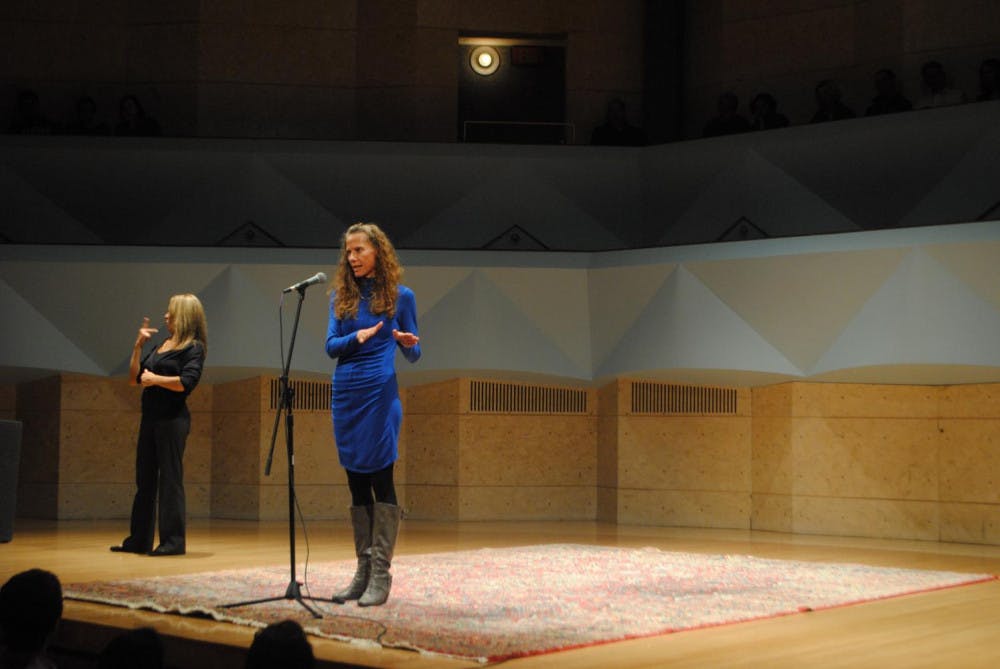Amid the reunions, career talks and campus tree tours of Fall Family Weekend, a storytelling event called Cocoon brought capacity levels of parents, students and community members to Robison Concert Hall on the evening of Saturday Oct. 14. One would be hard-pressed, as co-organizer Jocelyn Zemach ’18 says, to find an audience as supportive and responsive as the one cheering, clapping and chuckling in the concert hall that evening.
The six storytellers of the evening each stood alone in the spotlight of an empty stage, sharing their experiences on the theme of “boundaries.” The setting was reminiscent of the hushed and intimate back-porch beginnings of the Moth, upon which Cocoon and the monthly Middlebury Moth-UP are based. Now a nationwide storytelling phenomenon, the Moth began as a gathering of friends in Georgia on a porch where moths would “flutter in through a hole in the screen” and was later recreated in a living room in New York City.
First to take the stage was former chaplain Howard Fauntroy ’89. An alumnus of both Middlebury College and the Dissipated Eight acapella group, he recalled a story from his preschool years when he channeled the strength of his mother Carmen to stand up against a person of power — his father, in this case — to challenge an unfair judgment on his actions.
“Our spirits and bodies are mixes of both our moms and our dads,” he noted.
Ben Sanders ’18, an aspiring poet and avid hiker, followed with a story about a camping trip with his mom, a “meticulous planner,” his dad, “a metaphysical photographer,” and his two siblings. He shared that despite the points of tension their family experienced on the trip, a conversation with his mother was still able to bring him face to face with the visceral and vulnerable state of “feeling like a baby.”
The process of crafting a story can also be enlightening for the storyteller. Kathryn Bervin-Mueller P’18, the third speaker of the event, expressed afterwards that articulating her story helped her better appreciate parallels between her childhood experiences in foster care and the decisions she and her husband made in building their own family later in life.
Nonetheless, Zemach, who served with Tabitha Mueller ’18 as co-organizer and host for the event, said that the purpose of storytelling, cathartic as the process may be, is not only to appease oneself.
Through storytelling, she reflected, we “move closer inch by inch, to strangers and friends [in the audience] alike.”
“The inclination to want to share a story is step one,” Zemach said.
The production of a relatable and effective story, however, requires extracting parts of a deeply personal narrative to produce a shareable experience that resonates with the listeners. All Cocoon storytellers undergo a workshopping process where producers help the storytellers enhance and refine aspects of their stories while keeping intact the tales’ authenticity, in an approach similar to that of curators working with artists to better present their work to the audience.
After the intermission, Josh Goldenberg ’18 described his first unsuccessful attempt at romantic intimacy, which brought a few knowing chuckles in the audience. Facing the subsequent “wave of insecurities” taught him to “ride [his] emotions,” a lesson he shared with the audience.
Community member Hannah Manley of Homeward Bound, Addison County’s humane society, recounted her physical and emotional struggles with infertility and shared her journey in coming to terms with events in life that are out of her control.
In keeping with the spirit of Fall Family Weekend, all of the stories shared were rooted in familial and romantic relationships. The stories presented family as a common narrative of the human experience that connected listeners and speakers of different genders, ages, personal and political beliefs, and life experiences. The atmosphere of rapport in the auditorium reflected the listeners’ appreciation of the speakers’ generosity and courage in relaying, to an audience of mostly strangers, their deeply personal stories of fear and hope, struggle and belonging.
The last speaker of the night, Brett Millier, a professor of English and American literature, told a serendipitous story about a former student who reminded her very much of herself. She spoke about the chain of kindness that supported her and her student in their own academic and professional lives and in later supporting others in the world community.
“We affect one another’s lives in ways we don’t realize,” Professor Millier said, “even when we didn’t mean to, even when we are thinking only of ourselves.”




